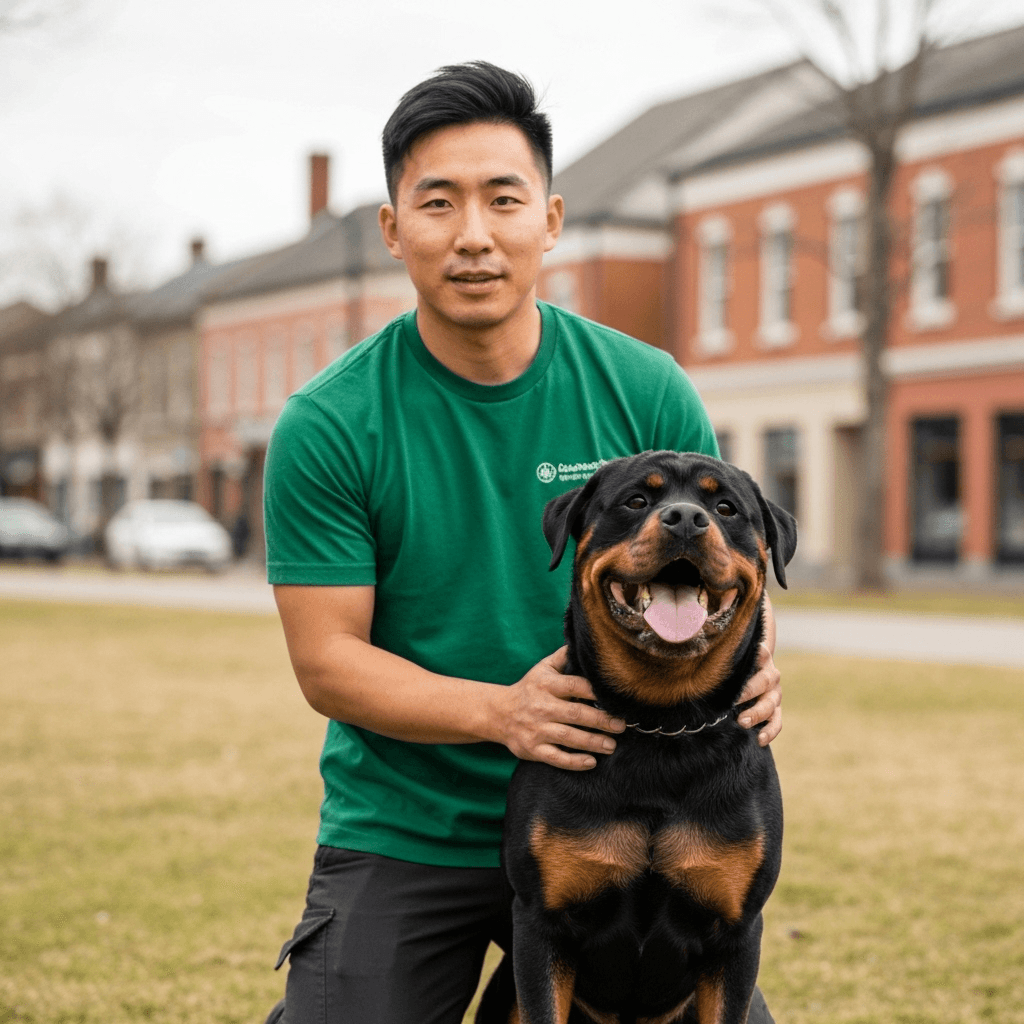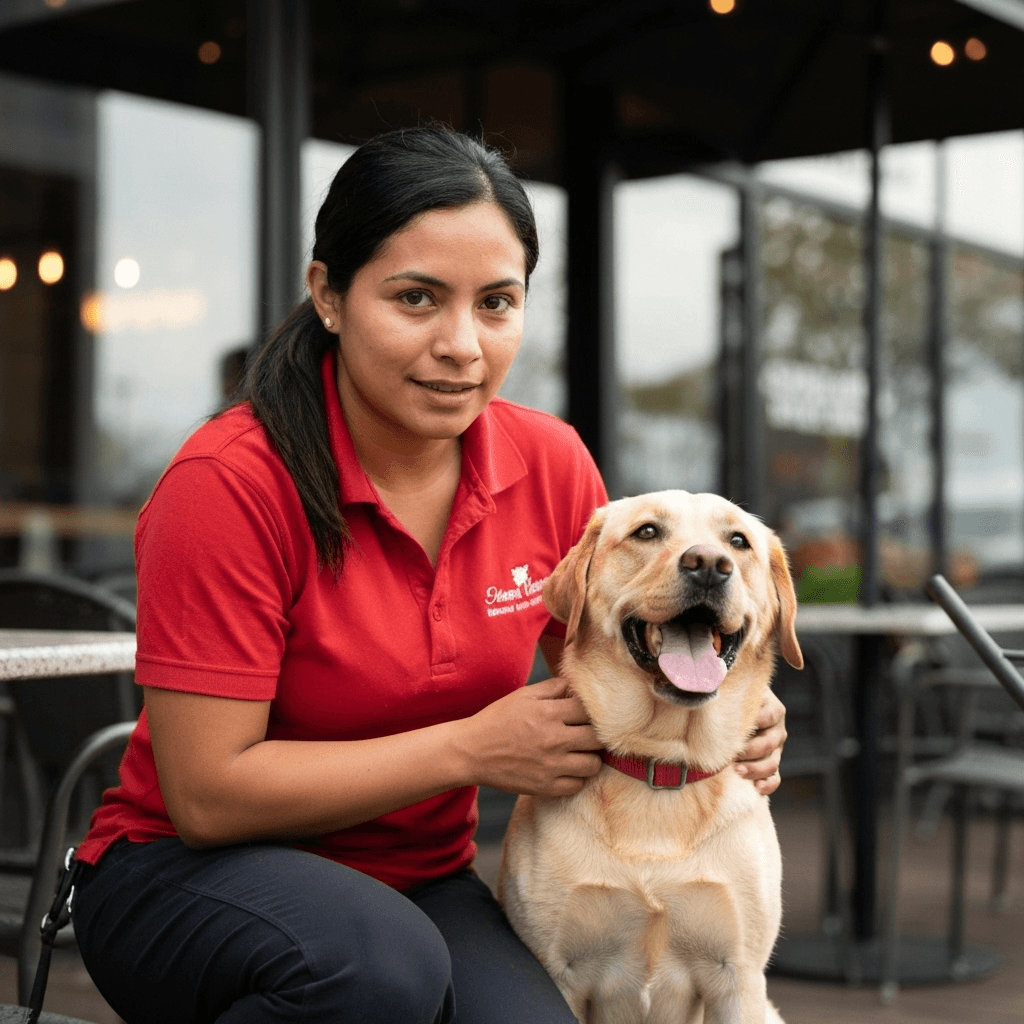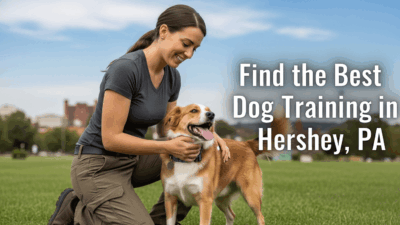Your Complete Guide to Choosing a Dog Trainer in Hershey
When you’re walking your dog down Chocolate Avenue or letting them stretch their legs at Shank Park, you want to feel confident they’ll behave well around other families and distractions. That’s where good training makes all the difference.
Here in Hershey, we’re lucky to have plenty of open spaces and dog-friendly spots, but that also means your pup needs to know how to handle crowds during baseball games at the stadium or stay calm when kids are playing at the community center. The right trainer will help you practice these real-world situations, not just perfect behaviors in an empty classroom.
Since Hershey sits in Derry Township within Dauphin County, there are specific local rules about where dogs can go and how they need to behave in public spaces. A good local trainer knows these ins and outs and can help you navigate them smoothly.
How to Choose the Right Trainer
The best trainers use positive reinforcement methods that make learning fun for your dog while building the skills you actually need. Your dog should learn to walk nicely past the busy youth sports at Shank Park, greet people politely on Cocoa Avenue sidewalks, and stay focused even when there are families having picnics at Bullfrog Valley Park.
Credentials give you a way to compare different trainers and understand their experience. Here are the main dog trainer certifications you’ll see, and what each one means for your training:
- KPA-CTP shows deep skills in reward-based training methods
- CPDT-KA means they’ve passed tests and keep up with continuing education
- IAABC-CDBC specializes in complex behavior problems
- CBCC-KA focuses on aggression and reactivity issues
- CTC emphasizes science-based approaches to behavior change
- CPDT-KSA includes hands-on skill assessments
Think about what type of training fits your life. In-home dog training tackles problems right where they happen – your dog jumping on visitors at the front door, barking at windows, or pulling toward other dogs on your usual walking route. Group classes work great once your dog can focus around distractions, and they’re perfect for socialization. Day training and private lessons can be lifesavers when your schedule is packed but your dog still needs consistent work.
Always ask about liability insurance and make sure you understand their policies on cancellations, travel fees, and safety protocols. Many trainers offer a free consultation, which is a perfect chance to see if you and your dog feel comfortable with their approach.
Common Dog Training Methods Explained

Basic obedience covers the foundation skills every dog needs: sit, down, stay, coming when called, and walking nicely on a leash. These skills make everything easier, from navigating Hershey’s busy sidewalks to enjoying patio seating at local restaurants during events.
Puppy training is all about starting on the right foot. Young dogs need socialization with different people and experiences, potty training, getting comfortable in a crate, learning not to bite so hard during play, and basic leash training. Puppy sessions are usually short and upbeat since little ones have limited attention spans, but they prevent a lot of problems later on.
Behavior modification addresses more serious issues like reactivity toward other dogs, fear of certain situations, resource guarding, or separation anxiety. This type of training uses careful step-by-step plans with techniques called desensitization and counterconditioning. It takes patience, but it can completely transform a dog’s quality of life.
Group classes and puppy classes teach your dog to pay attention to you even when there are other dogs and people around. Look for small class sizes, plenty of space for each dog, and clear safety rules about interactions.
Some dogs need specialized training like therapy dog training or service dog training. These programs require structured training programs, rock-solid neutral behavior in public, and careful tracking of progress over time.
Stay away from trainers who use intimidation, fear, or pain to get results. Besides being unkind to your dog, these methods often backfire and don’t meet the community standards for how dogs should be controlled in public spaces around here.
Average Cost of Dog Training in Hershey PA (Updated for 2025)
Training costs in Hershey and throughout Dauphin County depend on the trainer’s experience, how far they need to travel, and whether you’re meeting at their facility or your home. Here’s what most local dog owners are paying these days.
| Service Type | Typical Price (Hershey/Dauphin County) |
|---|---|
| Puppy or beginner dog training classes (4–6 weeks) | $140–$260 total |
| Group obedience training classes (4–6 weeks) | $150–$275 total |
| Private lessons (60–90 minutes) | $100–$170 per session |
| In-home coaching packages (4–6 visits) | $450–$900 total |
| Day training (trainer works your dog + handoff) | $400–$850 per week |
| Behavior consult for reactivity/anxiety (initial) | $140–$220 |
| Board and train (2–4 weeks) | $1,900–$3,800 total |
You might pay extra travel fees if you’re outside central Derry Township, and complex behavior problems usually cost more because they need longer initial assessments. Some trainers also need special permits or insurance to work in certain park areas, which can affect their rates.
Questions to Ask a Potential Dog Trainer
- What training methods do you use, and how do you keep sessions positive and low-stress for dogs?
- What credentials do you have, like KPA-CTP, CPDT-KA, or IAABC-CDBC, and why did you pursue those specific certifications?
- How will you help us practice around Hershey’s real distractions, like busy games at Shank Park or crowded downtown sidewalks?
- Do you offer in-home sessions, private lessons, group classes, or day training, and which approach would work best for my goals?
- How will we track my dog’s progress between sessions, and what kind of homework will you give me?
- What exactly is included in your price, are there extra travel fees for Dauphin County, and what’s your cancellation policy?
- Do you carry liability insurance, and can you show me proof of coverage?
- If my dog has aggression or severe anxiety issues, will you work with my veterinarian if needed?
- Do you offer a free consultation so we can make sure we’re a good fit before committing?
Local Hershey Rules and Considerations
Derry Township expects dog owners to keep their pets under control in public areas. Dogs need to be on leash in parks and shared spaces unless you’re inside a designated off-leash area. Always carry a standard 6-foot leash when you’re walking on sidewalks, using trails, or attending community events.
Pennsylvania requires all dogs 3 months and older to have annual licenses issued through their county, plus current rabies vaccinations with visible tags. You can find detailed information through the Pennsylvania Dog Law and state rabies guidance.
Problems like excessive barking or dogs running loose can lead to nuisance complaints from neighbors. It’s worth working on calm behavior when someone comes to the door, teaching your dog to settle in one spot when delivery drivers arrive, and making sure their recall is solid before you take them to busy community events.
Pennsylvania doesn’t require special licenses for professional dog trainers. However, if a business keeps dogs overnight for compensation, they may need a state kennel license depending on how many dogs they handle and their facility setup. Ask how any board and train programs are properly licensed and verified.
Many local parks require permits and proof of insurance for commercial activities. If your trainer plans to use township parks for lessons, make sure they have the required permissions.
Local Hershey Resources for Dog Owners and Surrounding Areas
- Shank Park, Derry Township: Great for leashed walks with plenty of ballfield activity to practice good behavior around distractions.
- Bullfrog Valley Park: The walking loop around the pond gives you steady foot traffic from joggers and families, perfect for practicing polite greetings.
- Downtown Chocolate Avenue sidewalks: Ideal for short training walks to work on loose-leash skills and staying calm near traffic and shop entrances.
- Beau’s Dream Dog Park at Buchanan Park, Lancaster: Fenced off-leash areas with agility features where you can practice recalls and controlled play.
- Lower Allen Dog Park at Lower Allen Community Park, Mechanicsburg: Another fenced option with separate areas when you need more space for focused training.
- Overlook Park Dog Park, Manheim Township: Popular spot with good turnover, so you can test your dog’s ability to stay calm during busy times.
Always follow posted rules at these locations, bring proof of vaccinations when required, and try to visit during quieter hours when you’re working on new skills.

Common Questions
How much does in-home dog training cost?
Most trainers in the Hershey area charge between $100–$170 per visit, with discounts available when you book multiple sessions. If your dog has complex behavior issues, the initial assessment might cost more because it takes longer.
Is in-home dog training worth it?
Absolutely. You get to work on problems right where they happen – whether that’s your dog going crazy at the front door, barking at things in the yard, or pulling toward every distraction on your neighborhood walks. This usually speeds up your results because your dog learns in their actual environment.
Can you pay someone to house train your dog?
Many trainers offer puppy programs that include setting up schedules, crate training, and potty training guidance. Day training can be especially helpful if you’re short on time, though you’ll still need to follow through with homework to maintain the progress.
What is the 3-3-3 rule for dog training?
This rule suggests giving dogs about 3 days to decompress in a new situation, 3 weeks to start learning routines, and roughly 3 months to feel completely settled. Training plans work much better when they account for this natural adjustment timeline.
How long will it take to reach my training goals?
Most dogs with basic behavior issues show solid progress within 4–8 weeks if you practice consistently every day. More serious problems like reactivity or aggression usually take several months of careful behavior modification work.
What should I bring to group classes?
Pack a flat collar or harness, a standard 6-foot leash, high-value treats your dog loves, water, and vaccination records if the facility requires them. Leave retractable leashes at home since they can be dangerous in group settings.
What’s the leash law in Hershey?
Derry Township requires dogs to be under control and on leash in all public areas unless you’re inside a designated off-leash dog park. Always keep a regular leash with you, even if your dog has great recall.
Do I need a dog license in Hershey or Dauphin County?
Yes, Pennsylvania law requires annual dog licenses for all dogs 3 months and older, and these are issued through each county. Make sure the license and current rabies tag are attached to your dog’s collar whenever they’re out in public.
What shots does my dog need in Dauphin County or Pennsylvania?
Rabies vaccination is required by state law. Your veterinarian will likely recommend other vaccines like distemper-parvo combination and bordetella based on your dog’s lifestyle and exposure risks. Check the state rabies guidance link above for current requirements.
Are dog trainers required to be licensed in Hershey or Dauphin County or Pennsylvania?
No, there’s no special licensing requirement for dog trainers in Pennsylvania. Trainers follow regular business regulations, though facilities that house dogs overnight for board and train programs may need state kennel licenses depending on their setup and capacity.
Where can I practice off-leash recall?
Fenced dog parks like Beau’s Dream Dog Park or Overlook Dog Park are your safest bet. Visit during quieter times to set your dog up for success, and consider keeping a long training line attached until their recall is completely reliable.
Which dog parks allow training around Hershey?
Most public dog parks welcome training activities inside their fenced areas as long as you follow posted rules and don’t disrupt other visitors. Be considerate by keeping sessions short and giving other dogs plenty of space.
What beaches or trails allow dogs for training?
While there aren’t ocean beaches nearby, many regional parks and state-managed areas welcome leashed dogs on their trails. Always stay on leash, respect wildlife, and use these outings to practice focus skills around increasing levels of distraction.
Do parks require permits for commercial dog training?
Some do. If your trainer wants to hold lessons in township parks, ask to see proof of any required permits and current liability insurance before you schedule sessions.
Finding the right dog trainer in Hershey comes down to matching your goals with someone who uses kind, effective methods and understands how to prepare your dog for real life in our community. Take time to ask about credentials, insurance, and how they track progress. Most importantly, choose someone who helps your dog feel confident and calm both at home and out in the places you love to go together.
